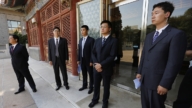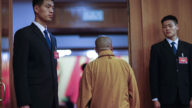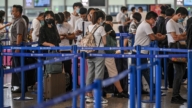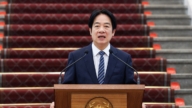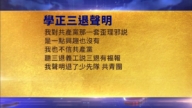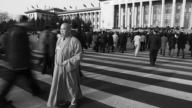【新唐人2014年11月10日讯】目前,中共官方正在进行新一轮的户籍改革制度,已经被中共固定在农村几十年“不许动”的农民,正在开始被移民小城镇。学者认为,因为地方政府需要土地生钱,正在用加快城镇化建设的方式,强迫农民城镇化。而实际上享有诸多福利和公共服务的大城市,农民是难以进去的,即使考入大城市的农民大学生,想得到当地的户口,也是难上加难。
目前,中共的又一轮户籍改革,似乎已经由下毛毛雨式的宣传,开始进入实质阶段。据中共喉舌《新华社》报导,日前广西北部湾已经制定出具体办法,来实现中共7月份的户籍制度改革。
中共国务院7月24号印发的《关于进一步推进户籍制度改革的意见》中说,为适应推进新型城镇化需要,要合理引导农业人口有序向城镇转移,有序推进农业转移人口市民化。
原中国青年政治学院副教授杨支柱:“户籍改革的思路主要是为征地,廉价取得农民的土地而制定的政策,政府卖地的钱比征地的钱10倍都不止,有一部分达到6、70倍。中国现在的户籍隔离不是城乡隔离,而是既得利益,发达地区对落后地区的隔离,大家都希望别人到我这儿来打工,但是我不给他户口,我不给他福利。”
学者指出,由于中共把民众的一部分税收,用于大城市进行福利和公共设施建设,造成城郊和乡村赤裸裸的贫困,甚至比非洲还穷﹔而大城市户口的含金量则是越来越高。
据《南方周末》报导,毕业8年的正规本科毕业生,要花费45万元才能拿到北京户口。而经过中介转手后,一纸北京户口竟然可以炒到72万。
在上海,户口的价值不仅体现在子女教育、医疗保障等多方面的福利上,买房买车,择偶方面的作用也很大,连生孩子街道还会补助3000元。调查显示,拥有上海户口的人中,有67%表示不会出卖户口。而愿意放弃户口的平均“要价”超过了90万。
最近中共国务院发改委规划司长徐林说,一个农民工变成市民,平均需要花费8万元到14万,城市越大花费越多。
杨支柱:“夸大其辞,他的目的不是阻止把农民变成城市户口,而是为了阻止农民到大城市来。”
独立人口学者何亚福:“其实把农村户口转入城市,政府是赚钱的,到城市打工的人大多数是劳动力,要去交社保的,上海那些大城市,如果没有外来人口交社保的话,它养老金制度是入不敷出的。”
实际上,据原中国青年政治学院副教授杨支柱此前发表的文章披露,交了社保的城市打工农民并不享受城市的福利。即使农民孩子大学毕业后在城市找工作也还是很困难,有的处境甚至还不如农民工,只好回农村要求恢复农民身份。当他们得知原来拥有的土地已经失去时,才大喊上当。但是他们上诉到法院时,因为他们的城市身份,还是得不到土地补偿金。
共产党夺权后,进行过几次户籍改革。50年代开始将国人身份,分为城市户口和农村户口,把农民固定在农村“不许动”,农民从此成为二等公民,农民想要出门做手艺,还要给生产队交钱,要大队里证明不是坏人。
上世纪80年代后期,户籍严控制度开始松动,大批农民开始进入城市打工,尽管农民工还是扮演召之即来挥之即去的角色,不过第一代农民工开始在城市扎根,他们结婚、生子,教育问题、医疗问题、劳动权益问题也随之而来,而农村的留守老人,留守儿童造成的悲剧也层出不穷。
采访编辑/刘惠 后制/舒灿
Hukou Reform Aims to Enclose Farming Land
For decades, Chinese peasants have been restricted
to the countryside.
The recent hukou system reform is ready to “invite" peasants
to move to small towns.
Experts believe the desperate need for cash has the local
governments turn to farming land.
Peasants are urbanized by speeding up urban construction.
But, to get into the big cities that enjoy many welfare
and social services isn’t so easy for peasants.
Even the college graduates of the peasants find it
extremely hard to gain house registration in the cities.
The new round of household registration, known as hukou
reform, has entered a practical stage.
Xinhua News Agency reports, Guangxi Beibu Gulf has
manufactured specific measures to implement
the hukou reform that was announced in July.
Chinese State Council introduced hukou reform on July 24
which intends to transfer rural population to urban
in the need to promote new city development.
Former Associated Professor of China Youth University
for Political Sciences, Yang Zhizhu: “The hukou reform policy
is intended to acquire farming land at low prices.
Land sale makes at least 10 times more than land
expropriation, some even at 60 to 70 times more.
Household segregation in China is not urban vs. rural,
but the vested interests
of the developed areas vs. the backward areas.
Migrants are welcome to work,
but at the cost of no household registration or social welfare."
It has been pointed out that welfare and public facilities
have been done in major cities, while suburbs and rural areas
have been left out in complete poverty,
even worse than the poor countries in Africa.
The hukou in large cities comes at a very high price.
Southern Weekly reported a Beijing hukou would cost
450,000 yuan for a college graduate.
It can be flipped to as high as 720,000 yuan through an agent.
In Shanghai, the value of a hukou is reflected in a wide range
of benefits such as education, medical care, auto and housing.
It also plays a role in spouse picking.
Child bearing is also subsidized with 3,000 yuan.
A survey has shown that 67% of Shanghai residents
would not sell their hukou.
Those who are willing to give up their hukou demand
an average of 900,000 yuan in compensation.
Director of the Planning Division of National Development
and Reform Commission, Xu Lin, recently indicated
an average cost of 80,000 to 140,000 yuan to the government
for a migrant worker to become a city resident.
The bigger the city, the higher the cost.
Yang Zhizhu: “It is exaggerated.
Its purpose is not to prevent the farmers from obtaining
a city hukou, but to stop them from going to the big cities."
Independent demographer He Yafu: “In fact, transferring the
rural hukou to city will allow the government to make money.
People who work in cities are mostly the labor force
and the social security payers.
Without these people to pay for the social security,
big cities such as Shanghai will have a pension system
that can’t make ends meet."
In fact, Yang Zhizhu’s previously published article has revealed
that migrants pay for the social security in the cities
but don’t enjoy the social welfare of the cities.
Their children still suffer from placement difficulty in the cities
after graduating from college.
Some encounter situations worse than the migrants
and thus demand to return to the rural areas.
But, they have lost their peasant entities with loss of the land.
When they realize that they have been deceived,
even their lawsuits won’t win them land compensation
due to their city identities.
Since the Communists took over the regime,
China has experienced several hukou reforms.
In the 50s, Chinese were divided into urban hukou
and rural hukou.
Peasants were limited to the rural
and became second-class citizens.
To conduct craft businesses, peasants were required to pay
the local production team to provide proof
that they are not bad elements.
In the late 1980s, the household registration system began
to relax and many peasants became migrants to the cities.
The first generation migrants, even though still suffering
from being kicked around, have started to root in the cities.
They got married and had children.
The issues of child bearing, education, medical and labor rights
have cropped up too.
Tragedies of the elderly and the youths
who were left in the rural areas have been endless.
Interview & Edit/LiuHui Post-Production/ShuCan


